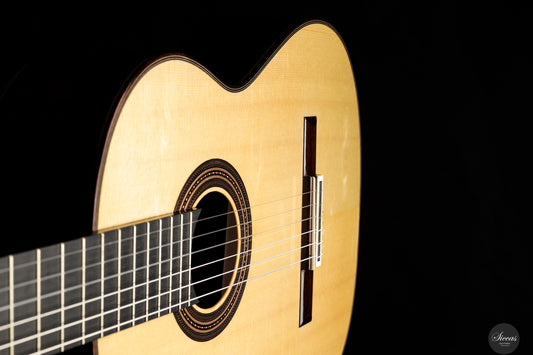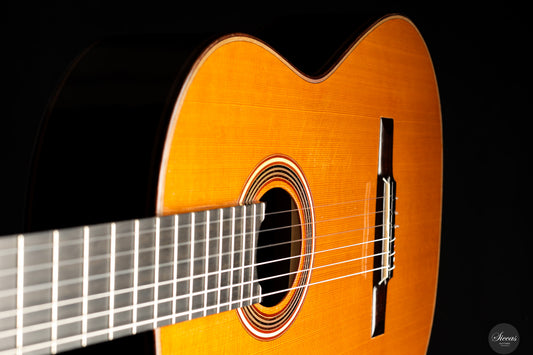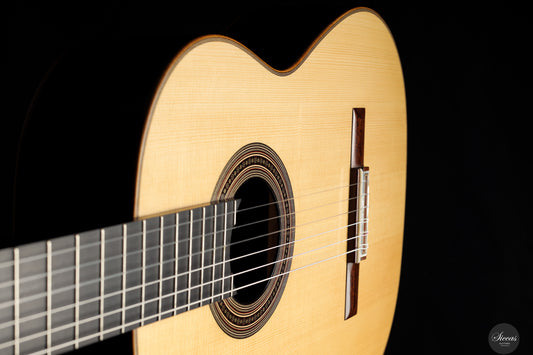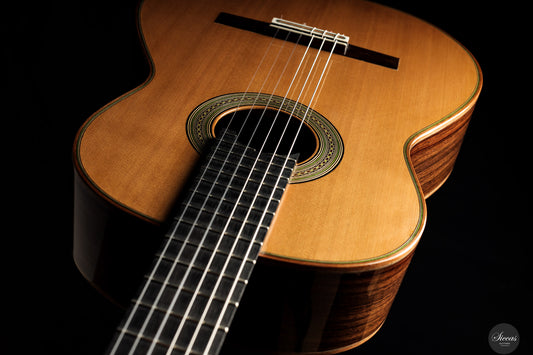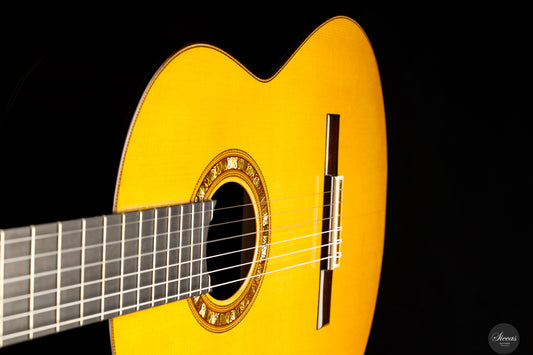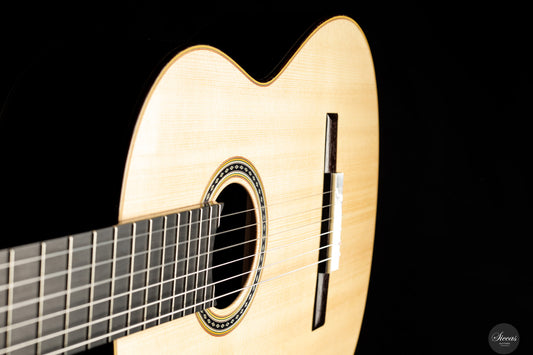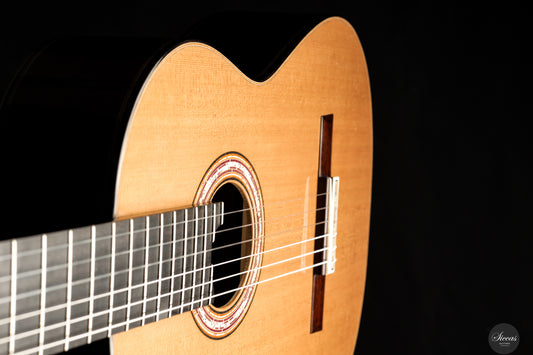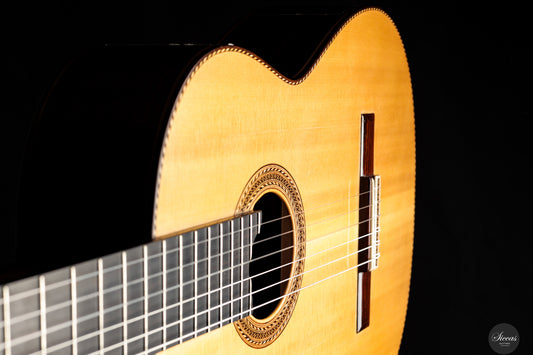
Which Classical Guitar Is Right for You? A Guide to Finding Your Perfect Match
Introduction: Choosing the right classical guitar can feel overwhelming, especially with the wide variety of options available. Whether you're a beginner, an intermediate player, or a seasoned guitarist, finding the perfect classical guitar involves considering factors like budget, tonewoods, size, and personal style. This guide will help you understand what to look for in a classical guitar, so you can make an informed choice and find an instrument that suits your playing level, musical goals, and sound preferences.
Define Your Skill Level and Purpose
Your playing experience and goals are the foundation for choosing the right classical guitar. Beginners, for instance, might prioritize comfort and affordability, while advanced players often look for superior tone and craftsmanship.
For Beginners: If you're just starting out, look for a guitar with good playability and quality construction at an affordable price. Beginner guitars generally cost between $100 and $500 and are designed for ease of use.
For Intermediate Players: Intermediate players may want to invest in a guitar with higher-quality tonewoods and craftsmanship to get a richer sound and improved durability. These guitars range from $500 to $1500.
For Advanced Players and Professionals: Professionals often invest in handcrafted guitars made from premium materials. These instruments, often above $1500, provide exquisite tone, responsiveness, and projection, meeting the demands of concert-level performance.
Tip: Identify your skill level and purpose first, as this will help narrow down options and ensure you get the best guitar for your needs.
Choose the Right Tonewoods for Your Sound
Tonewood significantly impacts the guitar's sound, so consider your tonal preferences when choosing a guitar. Different woods produce unique sound qualities, and the combination of top, back, and sides can affect resonance, volume, and warmth.
Popular Tonewoods:
- Spruce Top: Known for a bright, clear tone with excellent projection. Often chosen by players who want a versatile sound that works across genres.
- Cedar Top: Produces a warm, mellow sound with rich overtones, ideal for expressive playing styles and softer music.
- Mahogany Back and Sides: Provides a balanced tone with warmth and clarity, often found in beginner and intermediate models.
- Rosewood Back and Sides: Known for its deep, rich sound with strong bass response, commonly found in higher-end guitars.
Tip: Try guitars with both spruce and cedar tops to see which tonal quality you prefer. Spruce is brighter and louder, while cedar offers a softer, more nuanced sound.
Find the Right Size for Comfort
Classical guitars come in various sizes to accommodate different hand sizes and player preferences. Choosing the right size ensures comfort and helps you develop proper technique.
Common Sizes:
- 4/4 (Full Size): Standard size for adults and teens, providing full resonance and projection.
- 3/4 Size: Suitable for younger players or those with smaller hands, offering a slightly reduced scale length.
- 1/2 and 1/4 Size: Designed for children, these sizes make it easier for young players to hold and play the guitar.
Tip: Adults generally choose full-size guitars, but if you have smaller hands, trying a 3/4 size can offer more comfort without sacrificing much in terms of sound.
Consider Nylon String Tension
Classical guitars use nylon strings, but they come in various tensions, each affecting tone, playability, and volume. Nylon string tension ranges from low to high, and the choice depends on your playing style and preference.
String Tension Options:
- Low Tension: Easier on the fingers, providing a softer, warmer sound. Good for beginners or those focusing on fingerstyle.
- Medium Tension: Offers a balance between playability and volume, making it versatile for various music styles.
- High Tension: Requires more finger strength but delivers a louder, brighter tone. Often favored by advanced players who need more projection.
Tip: Try different tensions to find the feel and tone you like best. Medium tension is usually a safe starting point for most players.
Evaluate Craftsmanship and Build Quality
The quality of craftsmanship has a huge impact on the guitar's playability, sound, and longevity. Inspecting build quality is essential, particularly if you're looking at higher-end or handmade instruments.
What to Look For:
- Neck and Fretboard: Check that the neck is straight and the fretboard is smooth, with well-finished frets.
- Bracing Pattern: Traditional fan bracing is ideal for classical guitars, as it enhances resonance and tonal richness.
- Finish: Choose between gloss (which protects but slightly dampens sound) and satin (which allows more resonance but may be more prone to wear).
Tip: A quality guitar should feel solid and balanced, with a smooth neck and fretboard, even finish, and well-aligned bracing.
Test Playability and Action
Playability is how comfortable the guitar feels to play, and it's crucial for both beginners and advanced players. "Action" refers to the distance between the strings and the fretboard—low action makes pressing the strings easier, while high action requires more finger strength.
Action Tips:
- Low Action: Easier to play, ideal for beginners and fingerstyle players.
- Higher Action: Allows for a louder sound and less string buzz, but may require more finger strength.
Tip: Look for a guitar with a comfortable action height, especially if you're a beginner. Too-high action can lead to fatigue, while too-low action may cause buzzing.
Consider Acoustic vs. Acoustic-Electric Models
Acoustic-electric classical guitars come with built-in pickups, allowing you to amplify the sound for performances or recording sessions. Purely acoustic models, on the other hand, are traditional and focus purely on unamplified sound.
Who Needs Acoustic-Electric? If you plan on performing or recording in amplified settings, an acoustic-electric model provides flexibility. For home practice or unamplified settings, a traditional acoustic model is perfectly suitable.
Tip: If you choose an acoustic-electric model, look for one with a quality preamp system to preserve the guitar's natural sound when amplified.
Try Out Different Brands and Models
Each brand has its own sound and feel, so trying guitars from a few reputable brands can help you find one that resonates with your playing style and preferences. Some brands cater to specific skill levels, while others offer a wide range for all players.
Popular Classical Guitar Brands:
- Hanika: Known for reliable, affordable options, ideal for beginners and intermediates.
- Wolfgang Jellinghaus: Specializes in classical guitars, offering a range of models from entry-level to professional.
- Alhambra: Spanish-made guitars known for their rich, warm tones, preferred by intermediate and advanced players.
Tip: Visit a music store to try different brands, paying attention to the feel, tone, and response of each guitar. Each brand has a unique "character" that can make a big difference in your playing experience.
Set Your Budget and Stick to It
Classical guitars come in a wide range of prices, and setting a budget helps you narrow down your choices. Remember that quality matters, and investing in a reliable guitar can enhance your playing experience and progression.
Budget Ranges:
- Entry-Level ($100–$500): Good for beginners, offering decent sound and playability.
- Intermediate ($500–$1500): Offers better tonewoods, build quality, and sound, suitable for serious hobbyists and intermediate players.
- Professional ($1500+): Handcrafted with premium materials, offering exceptional sound and projection, ideal for advanced players and professionals.
Tip: Avoid the cheapest options if you're serious about learning, as quality can affect both sound and playability. Set a budget that balances affordability with quality.
Don't Forget Essential Accessories
Once you've chosen the right guitar, a few essential accessories will complete your setup and make your learning experience smoother.
Must-Have Accessories:
- Case or Gig Bag: Protects your guitar from damage.
- Tuner: Ensures accurate tuning, especially essential for beginners.
- Footstool: Helps with proper classical guitar posture.
- Extra Strings: Keep a spare set of nylon strings, as they need replacement every few months.
Tip: Invest in good-quality accessories to protect your guitar and improve your practice sessions. A case and tuner are essentials for any classical guitarist.
Conclusion: Find the Classical Guitar That's Right for You
Choosing the right classical guitar is a highly personal journey, and finding the right instrument involves considering your skill level, tonal preferences, and budget. By following this guide, you can confidently navigate your options, selecting a guitar that feels comfortable, sounds great, and inspires you to play. Whether you're just starting out or looking to upgrade, the right classical guitar will make every practice session and performance more enjoyable, helping you reach new heights in your musical journey. Start exploring, and let the perfect guitar bring your music to life!



